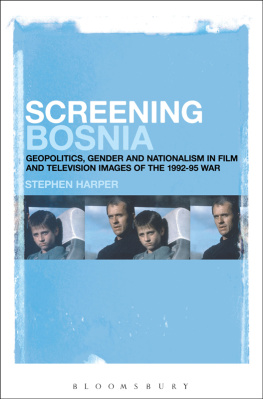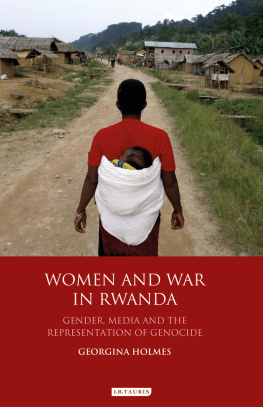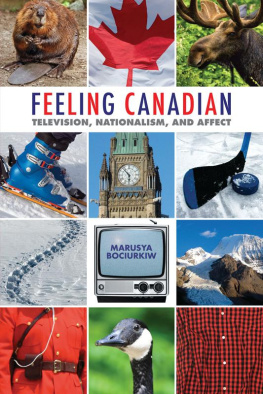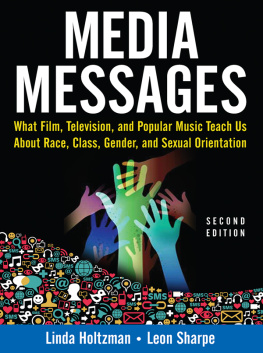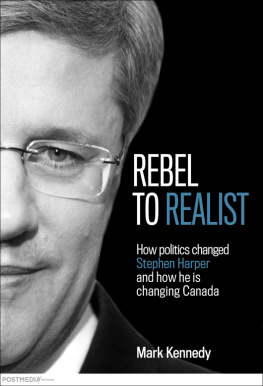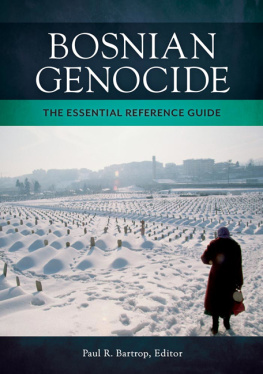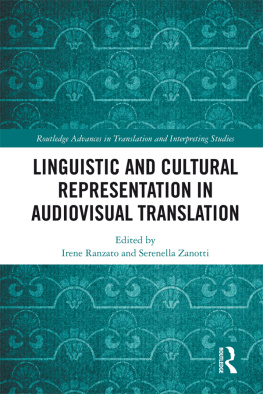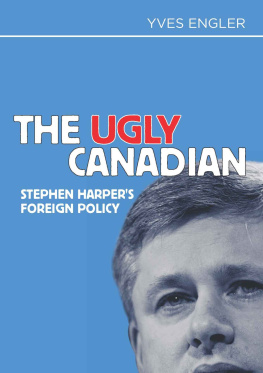I would like to thank those individuals who have directly or indirectly helped me to write this book. Meetings with several scholars, especially Milja Radovi and Dubravka arkov, provided me with an opportunity to discuss the book and inspired me to push ahead with it despite severe limitations on my writing time. Invitations to rehearse the books arguments at the University of Portsmouth, where I teach (thanks to Deborah Shaw), the University of Winchester (thanks to Neil Ewen) and London South Bank University (thanks to Philip Hammond) were also tremendously valuable. Several colleagues and acquaintances at the University of Portsmouth notably my friends and office-mates Simone Gumtau, Sally Shaw, Tom Sykes and Sophia Wood provided much good cheer during the writing process. Katie Gallof, the Film and Media Studies Acquisitions Editor at Bloomsbury, was an unusually attentive and helpful editor and I must also thank Bloomsburys anonymous manuscript reviewer for catching several solecisms before publication; all remaining deficiencies are, of course, my responsibility alone. Finally, I would like to thank my family in Scotland Anne, Mark, Hannah and Daniel Smith, Veronica Harper and Brian Davidson for their love and support. This book is dedicated to Binlan and to my son, Thomas.
For more than two decades now, cinema has played an important role in explaining and interpreting the Yugoslav wars of the 1990s for a global audience. This book discusses and critiques the representation of the 199295 Bosnian war in narrative film fiction since the end of the war, taking in productions from Holywood and Europe, including films made in the countries of the former Yugoslavia itself. It combines textual, historical and political analyses of film texts in an attempt to understand the cinematic representation of the wars complex political and diplomatic manoeuvrings, the discursive practices of journalists, the experiences of soldiers, the interventions of NATO and the UN, and the sufferings of civilians.
My interest in writing about cinematic images of the Bosnian war dates back to 2009, when it began to dawn on me that the public representation of the conflict was both a neglected and a contested subject. Towards the end of that year, I attended a British one-day conference about the televisual mediation of war. In the final panel of the day, I delivered a paper about screen images of the Bosnian war, focusing on Peter Kosminskys Warriors, which tells the story of British soldiers sent to Bosnia as part of the United Nations Protection Force in 1992. In order to contextualize my argument, which challenged some of the dominant Western assumptions about the war, I made some points that are rehearsed in the first chapter of this book. I pointed out, for example, that while Serb soldiers undoubtedly committed more atrocities in the Bosnian war than those fighting on the other sides, Bosnia was a multilateral civil war, a fact that problematizes the widespread portrayal of the Serbs as the conflicts sole aggressors. Moreover, I said, while the evidence surrounding particular cases might be patchy and unreliable, there were credible reports that militia in the Bosnian war sometimes attacked civilians belonging to their own ethnic group, probably in order to gain propaganda advantages.
While these points may be contentious to some, they are neither original nor especially controversial. Yet my raising of them upset one of the delegates, a journalist-turned-academic who had worked in Bosnia after 1995. During the question and answer session following my paper, the delegate challenged my suggestion that so-called false flag operations had taken place in Bosnia. When I provided evidence in support of the contention, he raised an eyebrow sceptically and agreed to follow up my references. He then pressed on, telling me that I had got my facts wrong: there had never been, he said, an UNPROFOR mission to Bosnia in 1992. This I knew to be false; nevertheless, for reasons of time and in order to avoid an unproductive and unseemly public squabble I declined to pursue the disagreement. A short silence followed, after which my talk received the statutory round of applause and the conference came to an end. As we left the conference centre for a nearby bar, another delegate told me that he had enjoyed hearing my paper, adding, sotto voce: But there was Srebrenica. This final remark was unsettling, not least because I had not denied nor would I ever deny that a dreadful massacre of Bosnian Muslim men and boys took place during the Bosnian war in that town.
After the conference, I received a graciously apologetic email from my questioner, conceding that the UNPROFOR mission was indeed factual. Yet I was left pondering some troubling questions about my experience at the conference. Why was my characterization of the Bosnian war as a civil war so scandalous to at least one or two of the delegates? How could it be that individuals possessing a sophisticated grasp of the geopolitics of contemporary conflicts seemed to have so little knowledge about the conflicts in the former Yugoslavia? And how was it that at an academic conference about media and war many of whose delegates approvingly discussed counter-hegemonic screen media narratives about the ongoing conflict in Iraq there seemed to be little readiness to critique the dominant media Western construction of the Bosnian war, to the point that I had come to be effectively accused, albeit privately and implicitly, of genocide denial for doing so?
In respect of these questions, some general observations ought to be made about the geopolitical context of discussions of the Yugoslav wars in the present era. For one thing, NATOs military actions in Yugoslavia have tended to be regarded positively, as a belated yet sincere attempt to achieve peace in the region. Many of the liberal-left academics and journalists who objected to British and US imperialist manoeuvres in Iraq and Afghanistan in the first decade of the twenty-first century adopted a decidedly less questioning orientation towards the Western foreign policy of the preceding decade, broadly supporting US military intervention in the Balkans. To take just a few examples: in a book condemning American foreign policy at the start of the twenty-first century, British journalist Will Hutton (2002: 14) looked back to Americas intervention in Kosovo in 1999 to prevent ethnic slaughter, remarking that it looks increasingly like the last act of the best of the twentieth-century US. The twenty-first-century US is a darker and less altruistic country. US academic Todd Gitlin (2008) has written that he opposed war in Iraq, despite having supported the Bosnia war and notes that he had been in favour of military intervention years before American, French, British, and other leaders finally aligned in the face of unending slaughter. Irwin Stelzer (2010: 20) has argued that stopping the genocide of Muslims by Serbs was acceptable, but that invading Iraq was a different matter. The liberal sociologist Anthony Giddens, meanwhile, has opined that the military interventions in Bosnia, Kosovo had been successes (Giddens 2010a: 26), but warned that the invasion of Iraq discredited the doctrine of liberal interventionism (Giddens 2010b: 5).
Although they have been challenged by many geopolitical commentators Noam Chomsky (2008), for example, is one widely respected and high-profile critic of the 1999 NATO bombing of Yugoslavia such positive evaluations of Western military action in the Balkans are widespread. One reason for this outpouring of Western liberal support for military intervention may have been that the Balkan wars of the 1990s mostly took place with Bill Clinton in the White House. Liberal intellectuals have often harshly criticized the Bush administrations gung-ho response the attacks on the World Trade Centre in 2001; but they have been less eager to censure overseas operations sponsored by Democratic administrations. The overseas record of US president Barack Obama, for example, received far less condemnation than that of his predecessor George W. Bush, despite its essential continuity with it (Ali 2010). Another reason for the paucity of criticism of Western foreign policy in the 1990s may be the historically low levels of class struggle and public engagement with foreign affairs during the period a situation that somewhat ameliorated in the following decade, as attested by the large-scale public demonstrations against the US-led invasion of Iraq in 2003. Finally, contemporary confusion about the Yugoslav wars of the 1990s may result from the sheer weight of misinformation and bias generated over the last two decades within both news media and popular culture a phenomenon addressed in this book.

